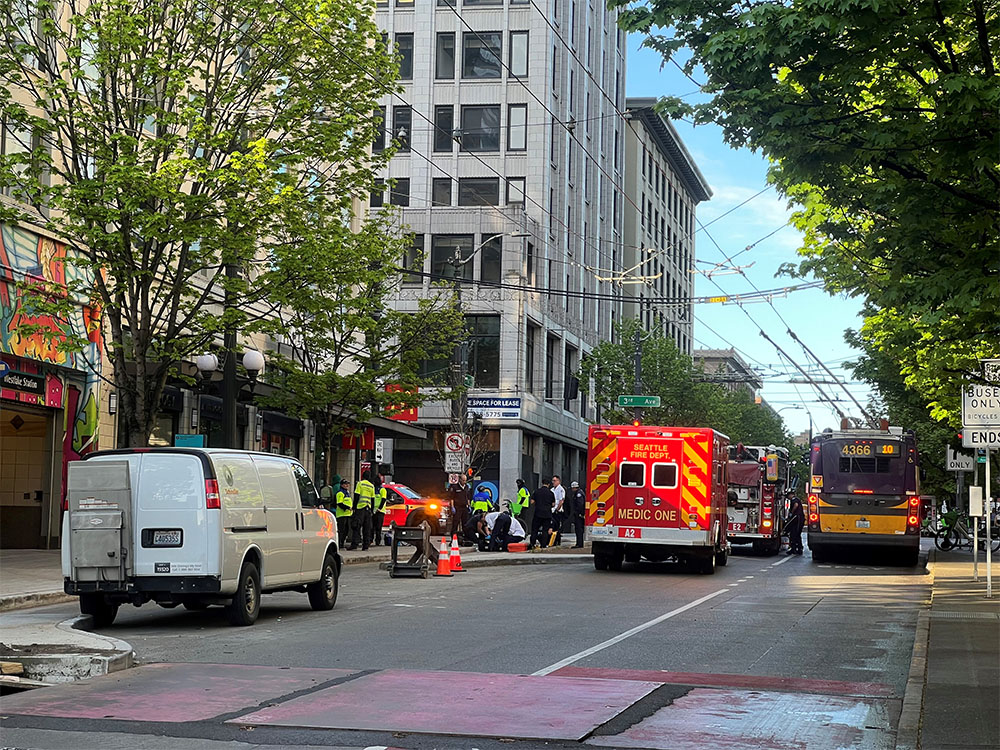News
KOMO 4: Seattle City Council passes new measures to combat sex trafficking and drug-related crimes
Posted on

This story was originally published by KOMO 4 on Sept. 17, 2024.
The council approved both of Councilmember Cathy Moore’s proposed legislations 8-1. Moore’s first legislation is a measure that includes Stay Out of Areas of Prostitution (SOAP). The council said the SOAP legislation includes a prohibition on loitering for buying, selling, or promoting prostitution.
The council’s newly passed legislation includes language regarding Stay Out of Drug Areas (SODA). The SODA zones will apply to people accused of drug-related crimes, including the use and possession of drugs. Six SODA zones were proposed, covering parts of Belltown, the area around Third and Pine, Pioneer Square, Capitol Hill, the University District, and the Chinatown-International District.
Moore issued a statement regarding the two newly passed legislations that can be read below:
“This afternoon’s passage of the SOAP legislation is in direct response to what I’ve heard from my constituent for months. It’s a victory for the safety of our community n along Aurora Ave N who have experienced escalating gun violence directly related to commercial sexual exploitation and pleaded for action by the city. This legislation also sends a clear message to those who perpetuate and profit from the harm and trauma of commercial sexual exploitation that there will now be consequences for their actions,” said Councilmember Moore. “I want thank Councilmember Kettle for his support of this legislation and for hearing it in the Public Safety Committee. I also want to thank my colleagues for their ongoing focus in improving public safety throughout our community and for exploring new thoughtful tools to protect our neighborhoods.”
“We are gathered here, as you can see, because I believe that this is ground zero for public disorder,” said Councilmember Tanya Woo. “We will fill a critical gap in our current legal framework and we will reclaim neighborhoods where neighbors, employers, shoppers, tourists and diners who have felt unsafe in the recent past will soon feel safe again.”
“For far too long the drug dealers have controlled these corners. They come and pedal poison and they create a lot of suffering and crime,” said Jon Scholes, the president and CEO of the Downtown Seattle Association. “Everybody in our city deserves to feel safe and welcome in this part of our town. It’s a lobby of our city that everybody should be welcomed to except for the drug dealers.”
The newly adopted SOAP zone would create a prostitution loitering misdemeanor law that applies to buyers and sellers. It also would create a new promoting loitering law to target traffickers and makes the crime a gross misdemeanor. The zone plans to extend along Aurora Ave N from N 85th St to N 145th St, and goes two blocks to either side of Aurora.
Moore said her constituents have repeatedly raised concerns about the sex trade leading to people being assaulted, school children solicited and shootings terrorizing the surrounding neighborhoods.
“It is attempting to find a way to disrupt and hold exploiters, pimps, accountable,” Moore said. However, ahead of the vote, extensive public testimony was offered both for and against the two measures.
“Sex workers, especially those working on Aurora, need resources and safe spaces. Further criminalizing them will fully affect sex workers ability to find regular jobs,” said Bingo, who identified as both a sex worker and performer.
Some opponents said the city is headed backward and is bringing back an approach that was repealed in 2020 because research showed the loitering law disproportionately caused harm to people of color without showing any evidence that it addressed sexual violence.
Opponents also cited research during their testimony that when exclusion zones were tried before, drug users and sex workers generally returned to the areas where they were banned. While police would be able to arrest women involved in prostitution, Moore’s bill makes diversion the priority to offer sex workers a path to get out of the illegal trade.
“We’re trying to address the maximum harm with minimum harm to the people who are engaged in selling by making it explicitly clear that diversion is the primary and preferred disposition.”
While promoting prostitution is a felony, Moore said it is difficult for police to make arrests because investigations are resource-intensive and often require women to speak against their exploiters, which can be challenging. Moore said this legislation lifts some of those barriers.
“It gives them the legal authority to approach and begin to investigate and ask questions and establish probable cause to arrest and to bring charges,” Moore said. “Right now, they don’t have that authority.”
Councilmember Robert Kettle said these two measures are pieces in a larger set of solutions to address the street disorder that is affecting so many in the city.
“We must start with compassion. We must have empathy for those individuals that are afflicted, but we cannot just stop there,” Kettle said. “We must have the wisdom too to look at the whole of community.”